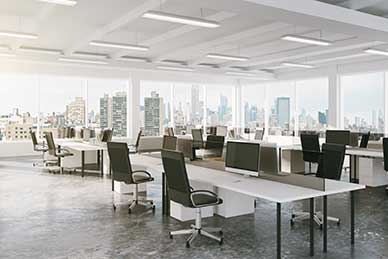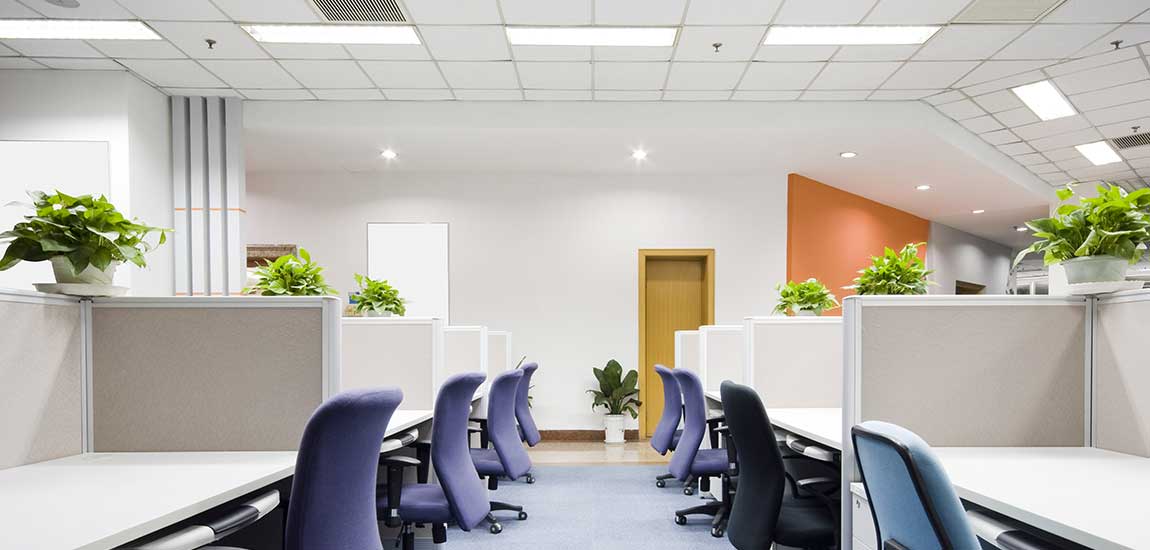There was a time when people lived by the rising and setting of the sun. Now, many people in the West live by the alarm clock and the punch of a time card. Between punches, we are left beneath the glow of artificial office lighting. While we all long for that corner office, many are left in the central cubicle. Why do we all covet the office with huge windows? More importantly, what effect does exposure to constant bright artificial office light have on our circadian rhythm?
Sunlight vs. Office Lighting
 Humans evolved under the light of the sun by day—and the lack thereof at night. It is deeply ingrained in us to be active while the sun shines and then to settle down to sleep when dusk hits. However, now the lines have blurred. For most of us, the cold glare of fluorescent lights dominates our lives. Not only are we trapped under bright lights all day, but we are chained to smartphones and other devices that emit artificial light as well.
Humans evolved under the light of the sun by day—and the lack thereof at night. It is deeply ingrained in us to be active while the sun shines and then to settle down to sleep when dusk hits. However, now the lines have blurred. For most of us, the cold glare of fluorescent lights dominates our lives. Not only are we trapped under bright lights all day, but we are chained to smartphones and other devices that emit artificial light as well.
How does this affect human health? According to a new study, the effects may be subtle and insidious. Researchers set out to study people who were exposed to natural light compared with those who spent their days under artificial lights. In a nutshell, it was found that people who have little exposure to natural light throughout the day have a lower quality of life in general.
How do we know that these cubicle workers have a lower quality of life? Researchers studied groups who worked in offices lit by windows and compared them to those who work in areas without windows. People who live without natural light rate their sleep quality and even their quality of life lower. There is a good reason people fight for that corner office; it improves their physical and mental health.
The Grim Reality of Office Lighting
In nature, light changes in tone and color throughout the day. This change in color is registered by your brain and used as information to guide your circadian rhythm. On the other hand, artificial light remains the same all day. This may affect our circadian rhythms in ways we previously did not know. Your body has a harder time sensing whether it should be preparing to be alert or preparing for a nap. While constant artificial light can have an adverse effect on your health, there are ways you can mitigate the effects of working in a cubicle. Experts recommend that people with low exposure to daytime light make an effort to get outdoors, sit near a window and otherwise expose themselves to the healthy benefits of natural sunlight.
Is a Daytime Nap the Answer?
For many cubicle workers, early afternoon comes with a decrease in energy and alertness. Taking a short nap could increase your productivity in ways we previously did not realize. The circadian rhythm takes a short dip in the afternoon, an effect that is more noticeable in people without natural light exposure. Taking a nap when the urge strikes you could increase alertness and creativity in the hours before you clock out.
In fact, some of the world’s most productive employers encourage taking naps when the urge strikes. With over a third of American workers not getting enough sleep, even a short nap can make work more productive and more bearable. In fact, there is a coordinated effort to make nap time part of the American workplace due to the pervasive sleep deprivation that can make it difficult to be productive during this dip in the circadian rhythm.
Old Bodies in a New World
 While we now live under bright lights, this is not how we evolved. If you are looking for ways to be more productive in your day, it might be time to get in touch with your evolved self. Find ways to be more active. Seek light during the day and darkness at night. In short, try to live as our ancestors did as much as possible. These simple lifestyle changes often allow us to walk the fine line between the demands of our biology and the demands of modern life.
While we now live under bright lights, this is not how we evolved. If you are looking for ways to be more productive in your day, it might be time to get in touch with your evolved self. Find ways to be more active. Seek light during the day and darkness at night. In short, try to live as our ancestors did as much as possible. These simple lifestyle changes often allow us to walk the fine line between the demands of our biology and the demands of modern life.
Many people live without natural light in their days. However, there are ways to mitigate the damage to your circadian rhythm. By seeking sunlight wherever possible and taking naps when needed you will likely be able to walk the line.

